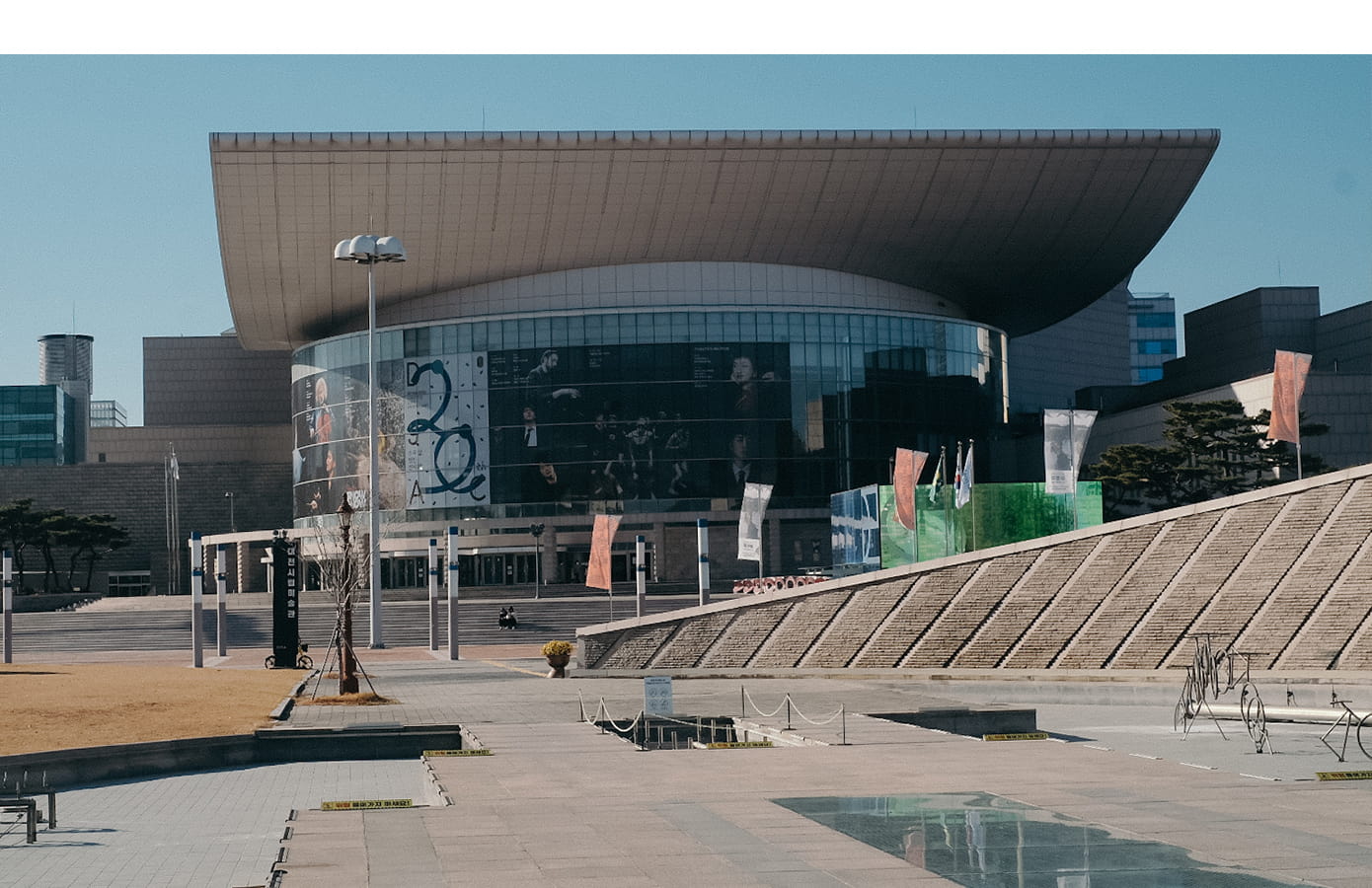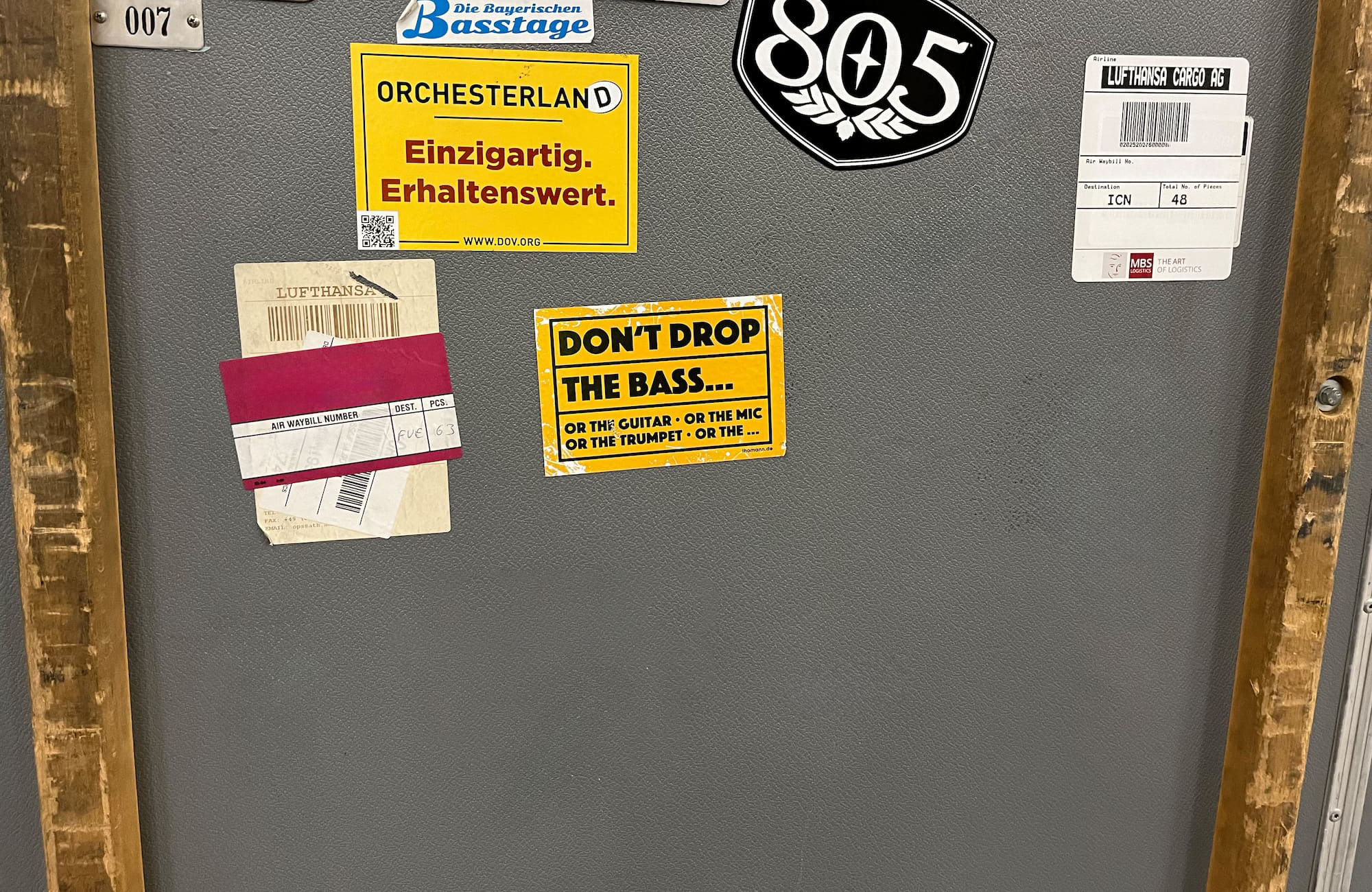
Don't drop the bass
The Munich Philharmonic Orchestra is on its way to Korea. When an orchestra goes on tour, not only the musicians have to travel, but also instruments of various sizes and types. The professionals at Luxreisen and MBS Logistics know exactly what challenges such a trip presents and how to overcome them. Read our full story below.
The security check scanner shows a black item. This transport box needs to be opened. Loadmaster Oliver Putzar is looking for the right key in his waistband to open the 2.14-metre-high crate. A double bass and a tuxedo are revealed behind it. He checks the image on the security scanner again. He has to search the upper right corner of the box. And he immediately finds what he is looking for. The double bass player had forgotten to remove a small deodorant spray. "It happens sometimes," summarizes the logistics specialist from Luxreisen. "But since the explosive detection dog can't get that high into the box, we may have to wipe it down again for the explosive detector."
Securing orchestra cargo is a complex matter that is always accompanied by specialists. They know exactly how to turn and place the crates, how to move the instruments, and they also know the peculiarities of the various orchestras.
"There are orchestras where there is one key to all the transport boxes, and there is nothing in those crates that is not allowed in the cargo. There are 50 crates that go through security and none of them have to be opened. But I've also taken whole cases of beer out of transport boxes. Guest gifts," he adds with a laugh.
At his side is Marius Wyrwa from MBS Logistics. Long before the day of delivery, Marius Wyrwa coordinates the procedure with everyone involved. He puts together a team with representatives from the travel agency, the freight forwarder, the warehouse staff and cargo airline to plan the entire process in detail. He holds all the logistical strings in his hands and is, of course, also on site on the day of delivery, during the security check and the set-up process.
While Oliver Putzar secures the crates together with the warehouse staff and the sniffer dog, Marius Wyrwa is at the customs office in Frankfurt. There are discrepancies regarding a violin bow. The antique piece was still made with ivory elements. Special CITES certificates are required for this, and customs will not accept the one at hand. The bow cannot be taken to Korea and remains in Germany. The musician is informed that he must bring a replacement. Shipping instruments of this class is a highly complex issue, regardless of how the instruments are handled. On the one hand, materials were used in the past that are no longer allowed and must be shipped with special certificates. On the other hand, some instruments are classified as cultural heritage. In this case, an export permit is required to take the instrument abroad.
|
The security check scanner shows a black item. This transport box needs to be opened. Loadmaster Oliver Putzar is looking for the right key in his waistband to open the 2.14-metre-high crate. A double bass and a tuxedo are revealed behind it. He checks the image on the security scanner again. He has to search the upper right corner of the box. And he immediately finds what he is looking for. The double bass player had forgotten to remove a small deodorant spray. "It happens sometimes," summarizes the logistics specialist from Luxreisen. "But since the explosive detection dog can't get that high into the box, we may have to wipe it down again for the explosive detector." Securing orchestra cargo is a complex matter that is always accompanied by specialists. They know exactly how to turn and place the crates, how to move the instruments, and they also know the peculiarities of the various orchestras. "There are orchestras where there is one key to all the transport boxes, and there is nothing in those crates that is not allowed in the cargo. There are 50 crates that go through security and none of them have to be opened. But I've also taken whole cases of beer out of transport boxes. Guest gifts," he adds with a laugh. |
At his side is Marius Wyrwa from MBS Logistics. Long before the day of delivery, Marius Wyrwa coordinates the procedure with everyone involved. He puts together a team with representatives from the travel agency, the freight forwarder, the warehouse staff and cargo airline to plan the entire process in detail. He holds all the logistical strings in his hands and is, of course, also on site on the day of delivery, during the security check and the set-up process. While Oliver Putzar secures the crates together with the warehouse staff and the sniffer dog, Marius Wyrwa is at the customs office in Frankfurt. There are discrepancies regarding a violin bow. The antique piece was still made with ivory elements. Special CITES certificates are required for this, and customs will not accept the one at hand. The bow cannot be taken to Korea and remains in Germany. The musician is informed that he must bring a replacement. Shipping instruments of this class is a highly complex issue, regardless of how the instruments are handled. On the one hand, materials were used in the past that are no longer allowed and must be shipped with special certificates. On the other hand, some instruments are classified as cultural heritage. In this case, an export permit is required to take the instrument abroad. |
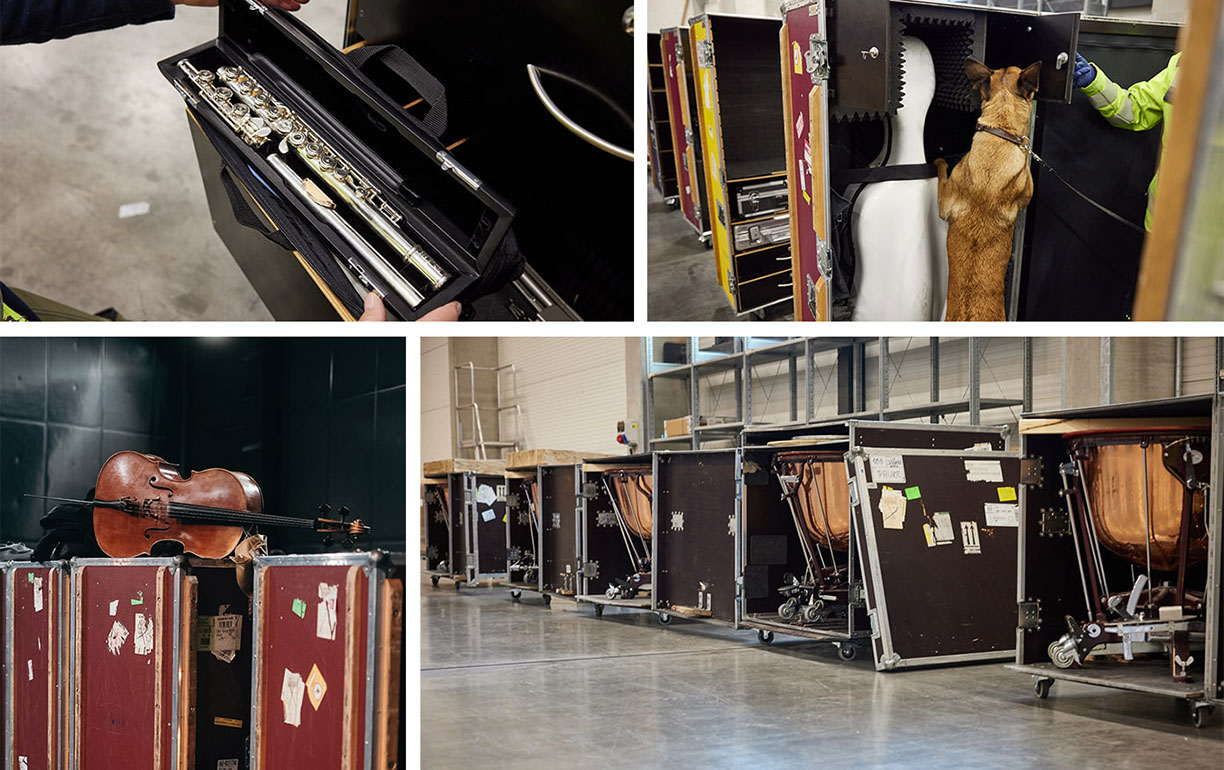
A glance into the transport boxes reveals instruments of all shapes, sizes and materials. The sniffer dog is unimpressed and fully focused on his target.
"Most people think about avoiding vibrations and certain temperature conditions when transporting instruments. These are important criteria. We can rely on Lufthansa Cargo's handling here. However, the real challenge is to handle the size of the shipment and all the formal requirements within a very tight time frame," explains Oliver Hamacher, Head of Airfreight at Cologne-based freight forwarder MBS Logistics.
The last orchestra rehearsal often takes place the evening before delivery at the airport. Another rehearsal and the first concert follow the day after arrival in the destination country. With a schedule like this, nothing can go wrong - from the special care during handling, to the securing according to LBA specifications, to the packing of the 48 pieces on just five special 3x2.1m loading pallets, to the delivery.
Hamacher admits that he is not the greatest music connoisseur. But he knows a lot about transporting instruments. Several times a year, the freight forwarder MBS Logistics organizes such shipments all over the world.
Lufthansa Cargo is also very familiar with the customs of transporting instruments. "We have a special and cooperative relationship with Lufthansa Cargo. Our colleagues are very familiar with the special requirements of these transports. We are therefore in close contact, which is very important for highly specialized instrument transports," says Hamacher.
For this shipment, MBS Logistics relies on the Lufthansa Cargo product Vulnerables in combination with the speed td.Flash. Vulnerables offers high security precautions, handling, storage and transport appropriate to the type of goods, and seamless traceability and monitoring. On request, the shipment can be personally accompanied during handling in Frankfurt. td.Flash is not limited by weight or size and offers the required speed and guaranteed capacity thanks to late acceptance and short transit times.
|
"Most people think about avoiding vibrations and certain temperature conditions when transporting instruments. These are important criteria. We can rely on Lufthansa Cargo's handling here. However, the real challenge is to handle the size of the shipment and all the formal requirements within a very tight time frame," explains Oliver Hamacher, Head of Airfreight at Cologne-based freight forwarder MBS Logistics. The last orchestra rehearsal often takes place the evening before delivery at the airport. Another rehearsal and the first concert follow the day after arrival in the destination country. With a schedule like this, nothing can go wrong - from the special care during handling, to the securing according to LBA specifications, to the packing of the 48 pieces on just five special 3x2.1m loading pallets, to the delivery. Hamacher admits that he is not the greatest music connoisseur. But he knows a lot about transporting instruments. Several times a year, the freight forwarder MBS Logistics organizes such shipments all over the world. |
Lufthansa Cargo is also very familiar with the customs of transporting instruments. "We have a special and cooperative relationship with Lufthansa Cargo. Our colleagues are very familiar with the special requirements of these transports. We are therefore in close contact, which is very important for highly specialized instrument transports," says Hamacher. For this shipment, MBS Logistics relies on the Lufthansa Cargo product Vulnerables in combination with the speed td.Flash. Vulnerables offers high security precautions, handling, storage and transport appropriate to the type of goods, and seamless traceability and monitoring. On request, the shipment can be personally accompanied during handling in Frankfurt. td.Flash is not limited by weight or size and offers the required speed and guaranteed capacity thanks to late acceptance and short transit times.
|
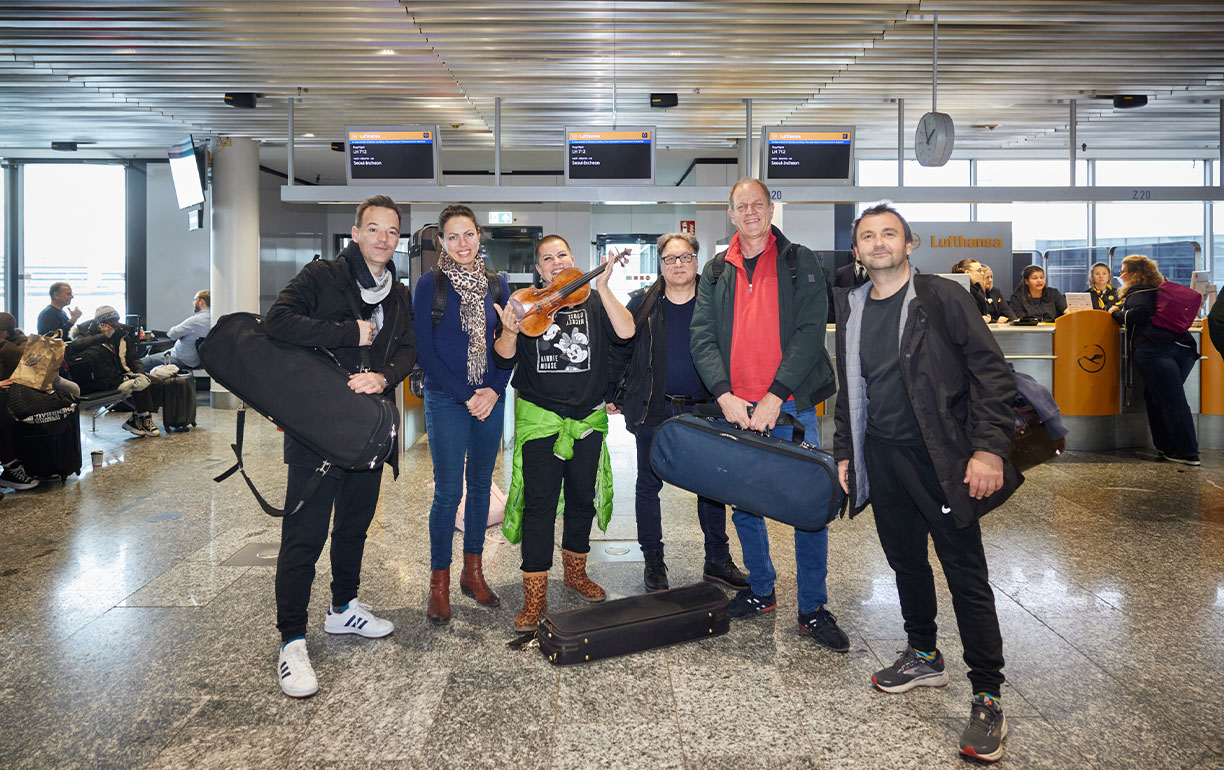
"Some instruments are not even in the cargo hold," says Annette Lux the next day when she meets the orchestra at the gate in Frankfurt, where they are waiting for their onward flight to Seoul on LH712. "In most cases, the musicians carry a Stradivarius with them. This can be for insurance reasons, but depending on the size of the instrument, the musicians don't want to let it out of their hands. Or they don't want to be without it for a few days for their own rehearsals." At the gate, you can also see many instrument cases on the backs and in the hands of orchestra members: violas, violins, trumpets, and oboes. "But I've also booked a seat for a cello several times in the past," says the business graduate, who has been accompanying orchestras since she was a child.
In 1972, her father founded Luxreisen - a travel agency specializing in choir and orchestra tours. In 1997, she became the second generation to take over Luxreisen - together with her sister Brigitta Lux since 2000. To this day, there are not many operators at the level of Luxreisen - about six in Europe and about ten worldwide - that can organize trips of this size and quality.
When you talk to Lux about her work, you immediately realize that her passion and profession go hand in hand. "I am motivated by the idea of bringing music and beautiful experiences into the world. Music is international understanding... more important than ever in this day and age.”
|
In 1972, her father founded Luxreisen - a travel agency specializing in choir and orchestra tours. In 1997, she became the second generation to take over Luxreisen - together with her sister Brigitta Lux since 2000. To this day, there are not many operators at the level of Luxreisen - about six in Europe and about ten worldwide - that can organize trips of this size and quality. |
When you talk to Lux about her work, you immediately realize that her passion and profession go hand in hand. "I am motivated by the idea of bringing music and beautiful experiences into the world. Music is international understanding... more important than ever in this day and age.” |
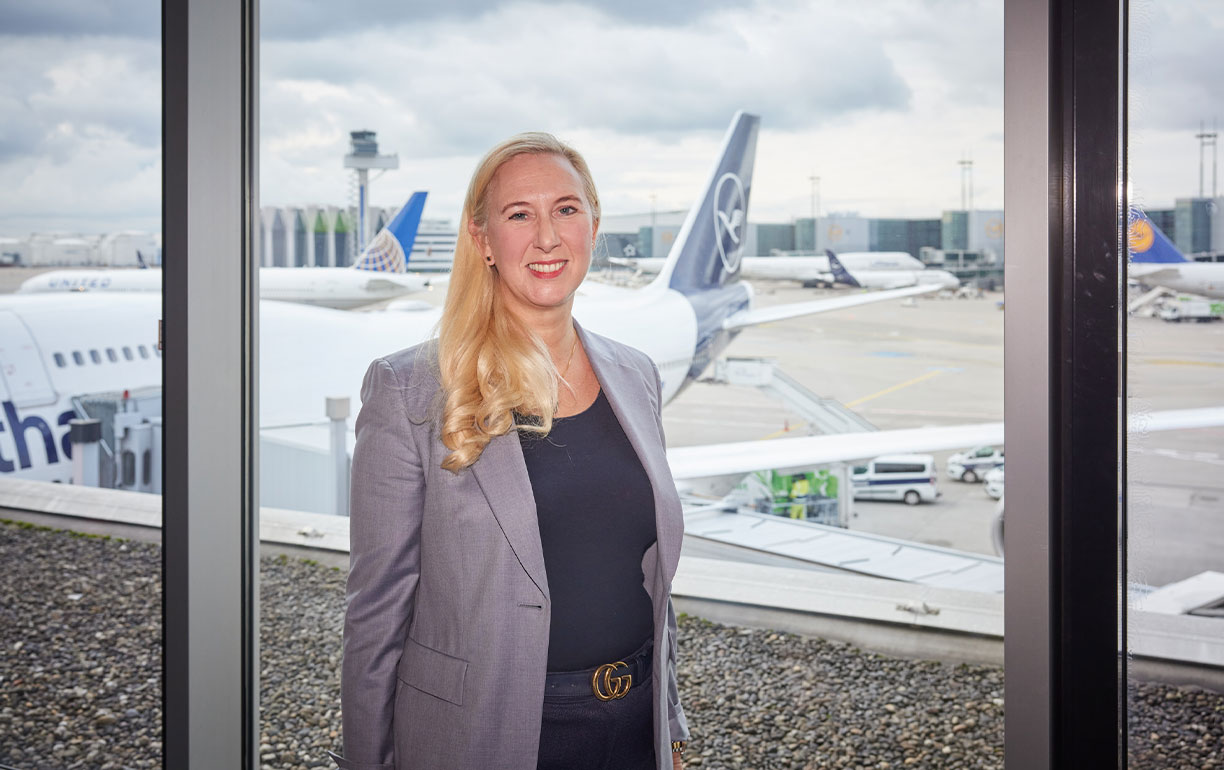
She has particularly fond memories of a concert by the Bamberg Symphony Orchestra, who were guests at the Teatro del Lago in Frutillar in southern Chile. "The concert hall is one of the most extraordinary in the world, located directly on a lake and next to a volcano. The setting is impressive. The orchestra was picked up in Rio by the Chilean president's Boeing 767. That was impressive too," she smiles.
Killian Geppert, stage manager of the Munich Philharmonic Orchestra, also has fond memories of special concerts. "We once had a special concert in Buenos Aires, right next to the obelisk. An eight-lane road was closed for the open-air concert, so there was room for 25,000 spectators." Memories like these make the enormous effort behind the travel organization worthwhile.
When asked if anything ever goes wrong, there are equally interesting stories to tell. Lux tells of a pallet of timpani that could not be taken on board due to the trim. The timpani arrived in Sao Paulo with a last-minute delivery. A concert without timpani roll? Unthinkable.
Lux also recalls a trip to the USA: "I once had an orchestra that was stuck in New York. They were supposed to play a concert in Florida, but in the morning a blizzard hit New York, shutting down air traffic. The first aircraft were able to take off in the afternoon, but all flights for the next three days were fully booked and we needed almost 100 seats for the musicians. Force majeure is no excuse. In my business, there are no problems, only solutions. The orchestra has to be there. In fact, we were able to arrange a charter flight on short notice, and the orchestra landed in Vero Beach in time for the concert."
|
Killian Geppert, stage manager of the Munich Philharmonic Orchestra, also has fond memories of special concerts. "We once had a special concert in Buenos Aires, right next to the obelisk. An eight-lane road was closed for the open-air concert, so there was room for 25,000 spectators." Memories like these make the enormous effort behind the travel organization worthwhile. When asked if anything ever goes wrong, there are equally interesting stories to tell. Lux tells of a pallet of timpani that could not be taken on board due to the trim. The timpani arrived in Sao Paulo with a last-minute delivery. A concert without timpani roll? Unthinkable. |
Lux also recalls a trip to the USA: "I once had an orchestra that was stuck in New York. They were supposed to play a concert in Florida, but in the morning a blizzard hit New York, shutting down air traffic. The first aircraft were able to take off in the afternoon, but all flights for the next three days were fully booked and we needed almost 100 seats for the musicians. Force majeure is no excuse. In my business, there are no problems, only solutions. The orchestra has to be there. In fact, we were able to arrange a charter flight on short notice, and the orchestra landed in Vero Beach in time for the concert." |
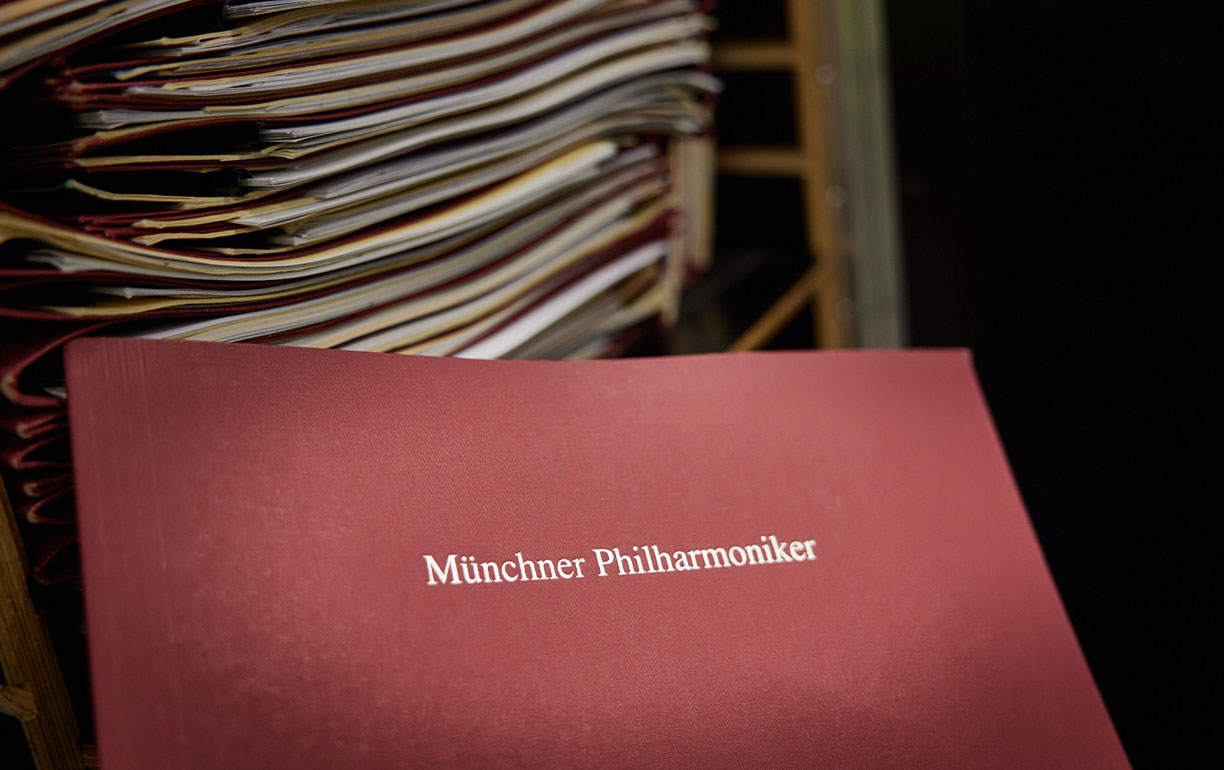
A service that does not go unnoticed by the Munich Philharmonic Orchestra. "We have been working with Luxreisen since the 1980s. They are incredibly competent, experienced, and reliable and can solve any situation, no matter how tricky," summarizes Killian Geppert.
It was precisely these exceptional situations that led her to choose MBS Logistics and Lufthansa Cargo. "For logistics on this scale, I need fixed contacts who know their way around," says the entrepreneur. "In the big forwarding companies of this world, I'm just an air waybill number and often get stuck in very rigid processes. MBS Logistics is a medium-sized, owner-managed forwarding company. Here I have personal contacts who think along with me and see our transport as a project and not as their daily task. Of course, my main concern is that everything goes according to plan. But no freight forwarder or airline can predict capricious weather conditions, for example. If there are any irregularities, I need a direct contact person who immediately understands what we need. That's important to me.”
Airfreight specialist Hamacher can confirm this: "The special thing about MBS Logistics is its family character. We are defined by our employees and our closeness to our customers. We know our customers and they know us. We are contact persons, and we know the needs of our customers. This is what the face in our logo stands for. It stands for every single member of our team. At Lufthansa Cargo, I also get this partnership-based cooperation with a fixed contact person who understands our needs."
At Lufthansa Cargo, that person is Dirk Müller-Glissmann and the Sales Team Germany West. "I am very pleased that our customers also feel that behind every eAWB and every process there is a person who takes care of them and makes sure that everything runs smoothly, even though a lot has changed and become more digital in our environment."
The freight forwarder and travel agency are also noticing the changes. Hamacher compares: "A lot of things that used to be done manually are now done electronically. For example, hardly any shipments are accompanied by a paper waybill. The air waybill data is transmitted digitally from the freight forwarder to the airline and then from the airline to the destination airport. In most cases, customs clearance is also automated via interfaces between the forwarding software and the customs system. Lufthansa Cargo has always been a driver of digitalization in the aviation industry. It makes a lot of things easier and more efficient."
Digitalization has also changed a lot for Annette Lux. Until 2007, she traveled on almost every tour. In 2023, she was only present on three out of 110 organized tours. "A lot has changed and is often better managed from home than on the road," she says of the digitalization of her industry. "But a real concert experience cannot be digitized." As a result, countless tours are already in the pipeline for 2024. The Munich Philharmonic Orchestra started the year with a tour to Spain and a trip to the USA, where they performed Brahms at the famous Carnegie Hall in New York.
Both the Philharmonic and Ms. Lux have dream concerts and trips in mind. For the Bavarian capital's Philharmonic, it is an open-air concert at the foot of Table Mountain or Machu Picchu. For Annette Lux, a dream will come true next year when the Bamberg Symphony Orchestra makes a stop in Iceland on its way to the United States. "I have always wanted to visit the Harpa Concert Hall in Reykjavik with its fiery red interior. I will be traveling to Iceland again at my own request," says Ms. Lux happily.
Table Mountain, Machu Picchu or Iceland. Lufthansa Cargo is happy to fly the instruments to concert halls all over the world.
|
It was precisely these exceptional situations that led her to choose MBS Logistics and Lufthansa Cargo. "For logistics on this scale, I need fixed contacts who know their way around," says the entrepreneur. "In the big forwarding companies of this world, I'm just an air waybill number and often get stuck in very rigid processes. MBS Logistics is a medium-sized, owner-managed forwarding company. Here I have personal contacts who think along with me and see our transport as a project and not as their daily task. Of course, my main concern is that everything goes according to plan. But no freight forwarder or airline can predict capricious weather conditions, for example. If there are any irregularities, I need a direct contact person who immediately understands what we need. That's important to me.” Airfreight specialist Hamacher can confirm this: "The special thing about MBS Logistics is its family character. We are defined by our employees and our closeness to our customers. We know our customers and they know us. We are contact persons, and we know the needs of our customers. This is what the face in our logo stands for. It stands for every single member of our team. At Lufthansa Cargo, I also get this partnership-based cooperation with a fixed contact person who understands our needs." At Lufthansa Cargo, that person is Dirk Müller-Glissmann and the Sales Team Germany West. "I am very pleased that our customers also feel that behind every eAWB and every process there is a person who takes care of them and makes sure that everything runs smoothly, even though a lot has changed and become more digital in our environment." |
The freight forwarder and travel agency are also noticing the changes. Hamacher compares: "A lot of things that used to be done manually are now done electronically. For example, hardly any shipments are accompanied by a paper waybill. The air waybill data is transmitted digitally from the freight forwarder to the airline and then from the airline to the destination airport. In most cases, customs clearance is also automated via interfaces between the forwarding software and the customs system. Lufthansa Cargo has always been a driver of digitalization in the aviation industry. It makes a lot of things easier and more efficient." Digitalization has also changed a lot for Annette Lux. Until 2007, she traveled on almost every tour. In 2023, she was only present on three out of 110 organized tours. "A lot has changed and is often better managed from home than on the road," she says of the digitalization of her industry. "But a real concert experience cannot be digitized." As a result, countless tours are already in the pipeline for 2024. The Munich Philharmonic Orchestra started the year with a tour to Spain and a trip to the USA, where they performed Brahms at the famous Carnegie Hall in New York. Both the Philharmonic and Ms. Lux have dream concerts and trips in mind. For the Bavarian capital's Philharmonic, it is an open-air concert at the foot of Table Mountain or Machu Picchu. For Annette Lux, a dream will come true next year when the Bamberg Symphony Orchestra makes a stop in Iceland on its way to the United States. "I have always wanted to visit the Harpa Concert Hall in Reykjavik with its fiery red interior. I will be traveling to Iceland again at my own request," says Ms. Lux happily. Table Mountain, Machu Picchu or Iceland. Lufthansa Cargo is happy to fly the instruments to concert halls all over the world. |
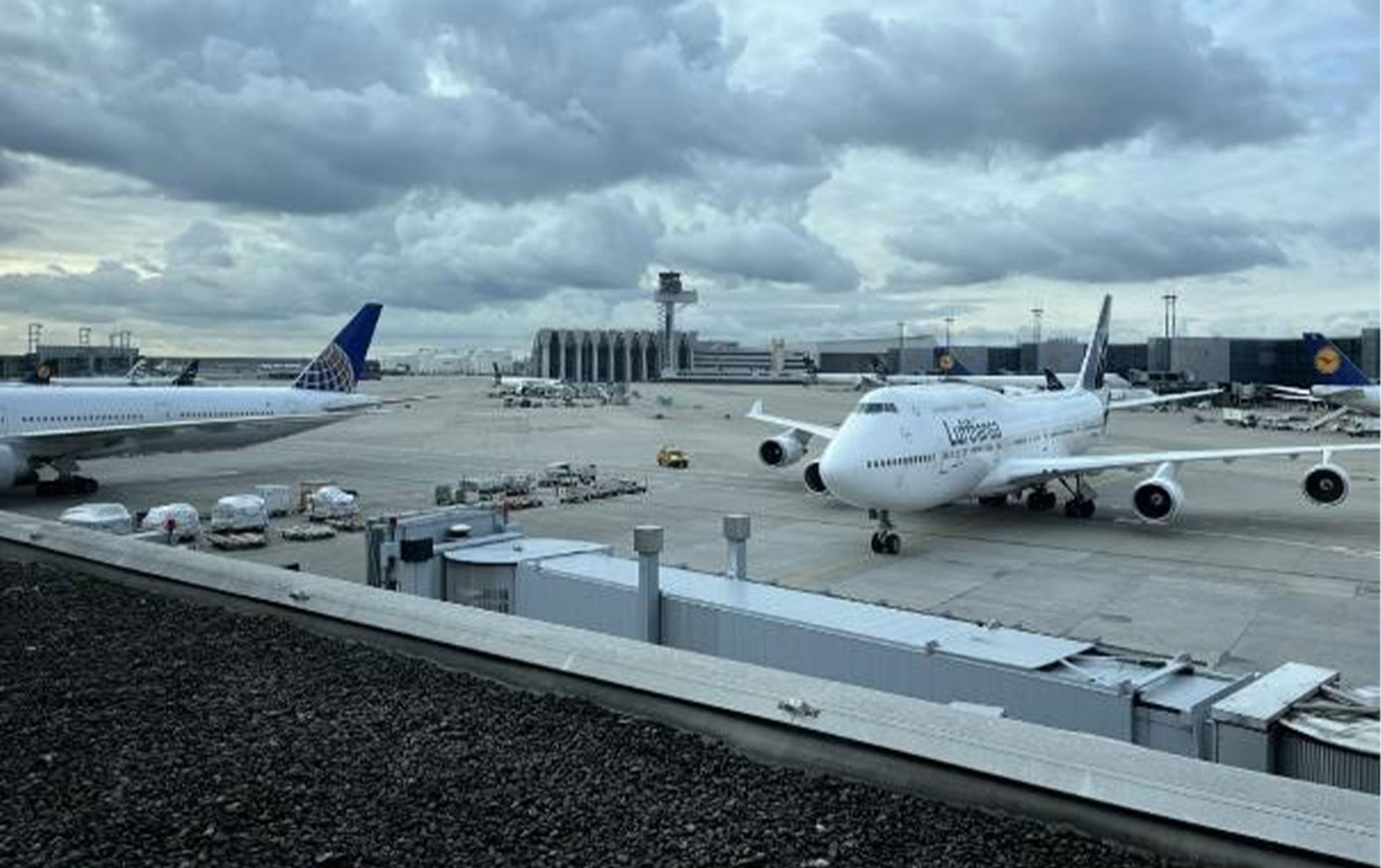
The instruments fly in the cargo hold of the Boeing 747 passenger plane on this journey. On the left, the pallets are already waiting for the arriving aircraft.
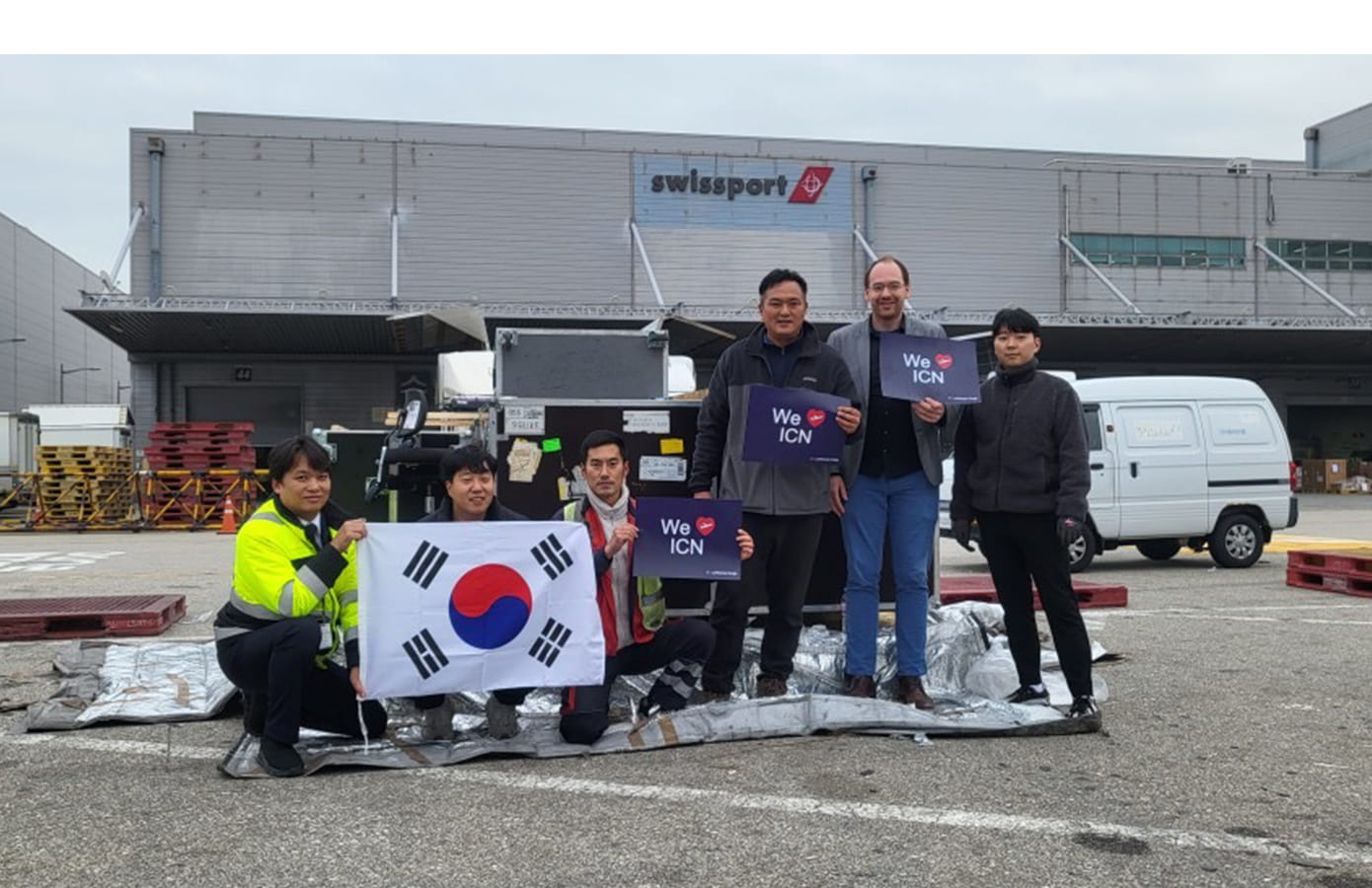
The colleagues in Seoul are also delighted with the Munich Philharmonic's special cargo, here at the breakdown with stage manager Killian Geppert.
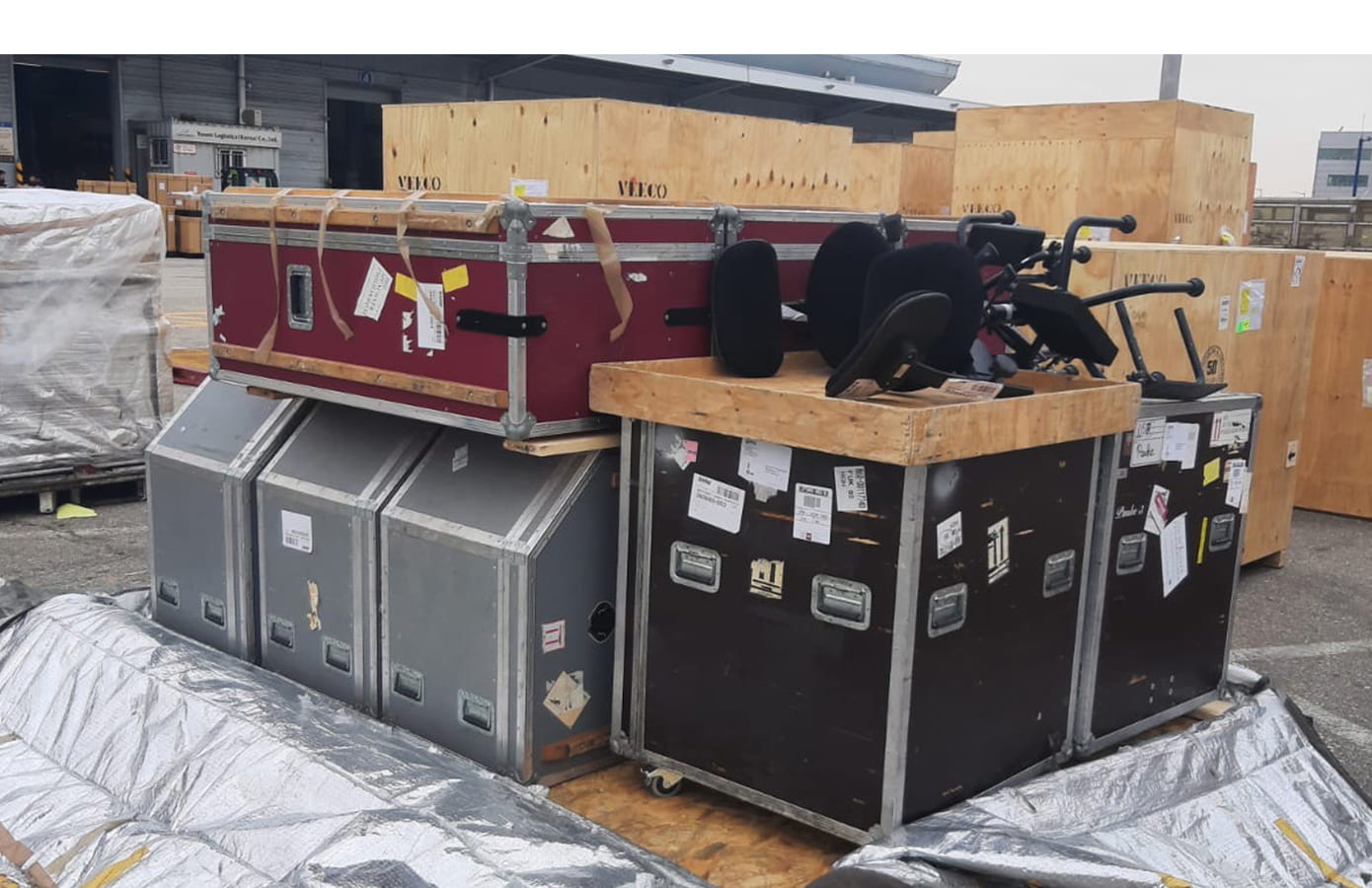
The build-up may remind a little of a Tetris game. The team managed to fit 48 parts onto five pallets. Here, the thermal covers have just been removed and the freight is being loaded onto the trucks for onward transportation in Korea.
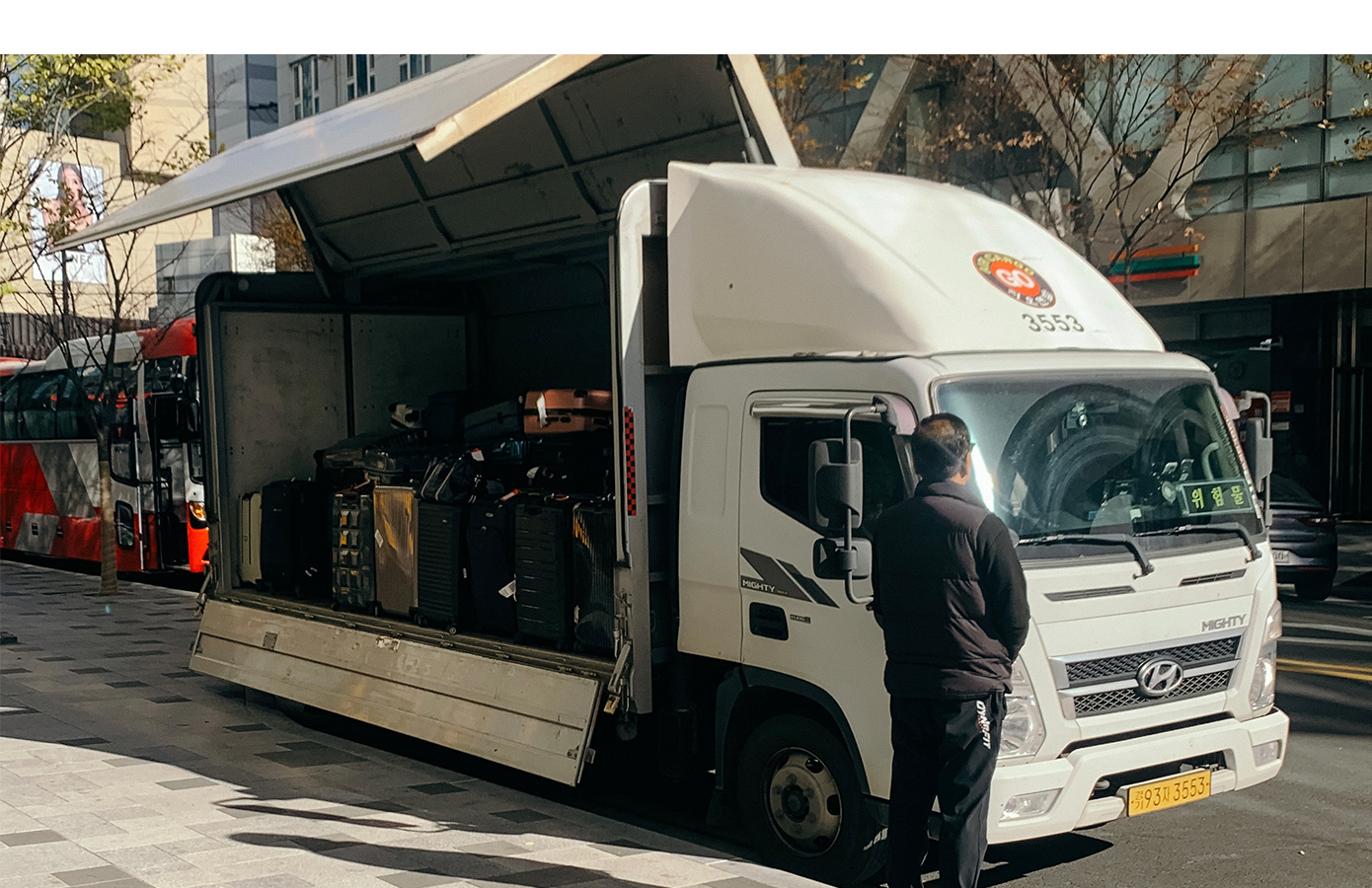
The logistics continue on site. The instruments are transported between six concert halls in Seoul, Sejong, Gwangju, Daejeon and Daegu.
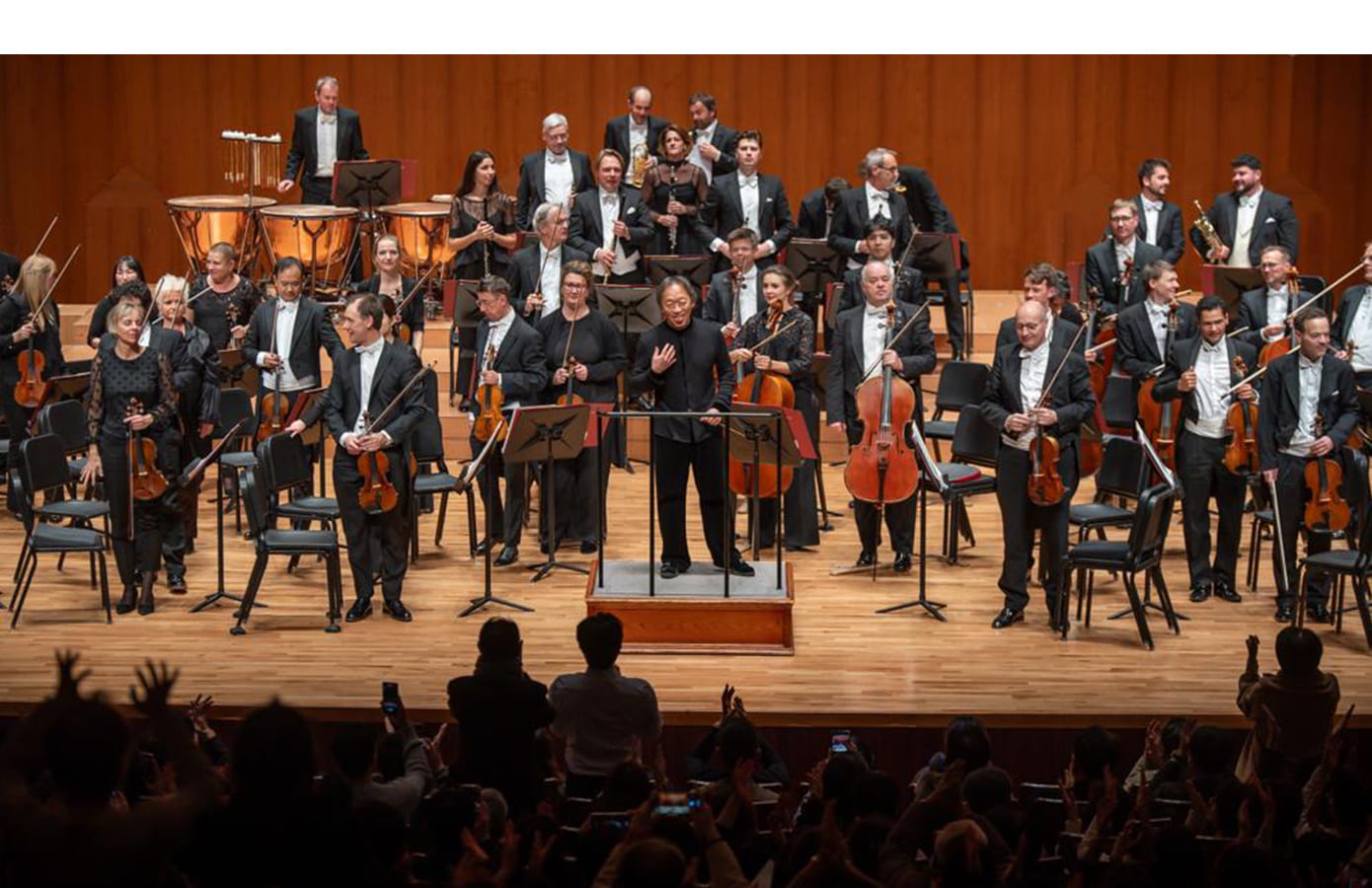
The Philharmonic Orchestra gave a total of seven concerts in eight days. All were conducted by Seoul-born conductor Myung-Whun Chung. The orchestra performed together with guest violinist Clara-Jumi Kang and guest pianist Yunchan Lim. They played works by Beethoven.
Photos: Münchner Philharmoniker, Uli Neumann-Cosel, Killian Geppert, Oliver Rösler, Lufthansa Cargo, Won Hee Lee, Sejong Center
Published 04/2024
Photos: Münchner Philharmoniker, Uli Neumann-Cosel, Killian Geppert, Oliver Rösler, Lufthansa Cargo, Won Hee Lee, Sejong Center
Published 04/2024

